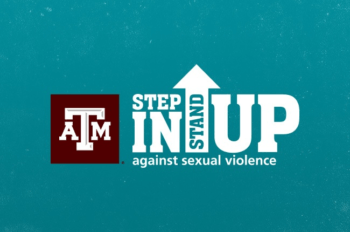Campus Resources Empower Survivors Of Sexual Violence
 Survivors of sexual assault may sometimes feel isolated, confused or helpless after an attack. Not knowing what to do next, like whether or not to report an assault or who to confide in, can potentially compound those emotions.
Survivors of sexual assault may sometimes feel isolated, confused or helpless after an attack. Not knowing what to do next, like whether or not to report an assault or who to confide in, can potentially compound those emotions.
While Texas A&M University students are not required to report an assault, opening up about an assault to a professional can help the victim cope with the experience, take away the fear of what lies ahead of them, and may help prevent future assaults on campus.
“It can be complex, and when someone is dealing with trauma it can become even more complicated. It’s important to have someone there to fill in those gaps,” Texas A&M University Police Department Victim Advocate Kristen Brunson said. “It’s empowering. When someone knows all their options, it gives the power back to the person. This allows for someone to share their story with whoever they are comfortable with and hopefully take away some of the fear of the unknown in regards to the next step.”
As a victim advocate, Brunson informs victims of their options and keeps them updated on their case status. She connects with victims through filed police reports or Texas A&M’s Student Assistance Services in the Offices of the Dean of Student Life. Victims can also report an assault directly to her, Texas A&M’s Title IX coordinator or one of three contacts on the Step In Stand Up website. Even with readily available resources, a 2015 Association of American Universities survey of Texas A&M students showed incidents are not reported for a wide array of reasons:
- 48.2 percent of respondents who were victims of penetrative acts involving force and 64.1 percent of victims of penetration due to incapacitation did not think the incident was serious enough to report.
- 47.2 percent felt embarrassed or ashamed and thus did not report the incident to an agency.
- 17.8 percent of female victims of nonconsensual penetration and 20.3 percent of female victims of sexual touching didn’t tell anyone about the incident. Approximately 38.6 percent of males did not report the event to anyone else.
Kristen Harrell, associate director of the Offices of the Dean of Student Life, said reporting incidents can allow law enforcement and/or the university to track where or with what groups sexual assaults occur, ultimately allowing them to address sexual assault at Texas A&M more effectively.
The AAU survey also showed that 72.6 percent of female victims of nonconsensual penetration told a friend. Harrell said that it is important for students who are friends of survivors to slow down and take the survivor’s emotional state into consideration.
“The thing for students to think about is that we have a gut reaction to report – to do it now, and that puts pressure on the survivor,” Harrell said. “We need to remember that the survivor has had their control taken away and we need to give them their control back. We don’t want to push them too far or too fast because there are a lot of things that have happened to them in that position.”
Media contact: tamunews@tamu.edu.





